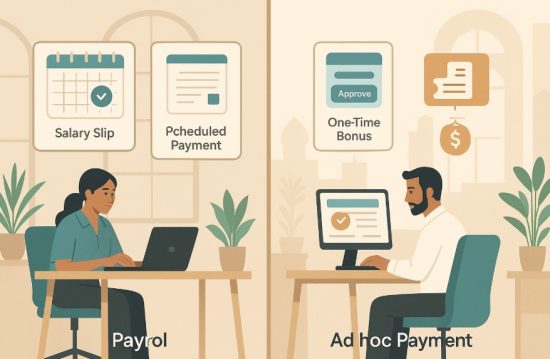
Have you ever had to make or receive a payment that falls outside the usual payroll or invoicing process? In today’s dynamic business environment, one-time payments are more common than ever, especially in fast-paced regions like the UAE.
These special payments are known as ad hoc payments, and they play a vital role in addressing unique financial needs quickly and efficiently. From rewarding employees to covering emergency expenses, ad hoc payments offer flexibility that structured payroll systems can’t always accommodate.
In this blog, you’ll gain a clear understanding of what ad hoc payments are, how they function in the UAE, when to use them, and what to consider while managing them.
We’ll also explore how technology like HR software can make handling these payments easier and more secure. Whether you’re an HR manager, a business owner, or a finance professional, this guide will help you navigate the essentials of ad hoc payments in the UAE with confidence.
What Does Ad Hoc Payment Really Mean in Payroll?

An ad hoc payment refers to any one-time or irregular financial transaction made outside a standard payroll or invoicing cycle. These payments are designed to address specific needs as they arise and are not part of any regular compensation plan or payment agreement.
Unlike recurring payments such as monthly salaries or scheduled vendor payments, ad hoc payments are made as needed. They can be issued to employees, contractors, vendors, or individuals in response to unique circumstances.
These payments typically occur under the following conditions:
- Bonuses for exceptional performance
- Overtime wages for extra work hours
- Holiday allowances or special incentives
- Reimbursements for out-of-pocket business expenses
Ad hoc payments differ from structured payroll because they are unplanned and manually initiated. This allows businesses to act swiftly in acknowledging contributions, addressing emergencies, or handling unforeseen costs.
These transactions are flexible but must be documented properly to avoid financial mismanagement. In UAE payroll systems, ad hoc payments are becoming increasingly essential, offering companies the agility to meet immediate obligations without disrupting regular payroll workflows. To summarize, ad hoc payments are spontaneous yet critical tools in modern compensation and financial practices.
When Should You Use an Ad Hoc Payment in the UAE?
Ad hoc payments are especially useful when immediate or unscheduled compensation is required. In the UAE, businesses often use ad hoc payments to address workforce or operational needs that fall outside routine payroll.
Common business scenarios where ad hoc payments apply include:
- Performance bonuses that are not part of regular salary structures
- Overtime pay for extra shifts or emergency tasks
- Reimbursements for business-related travel or purchases
- Allowances for temporary housing or commuting during assignments
UAE labor regulations recognize such flexible payment mechanisms, especially when structured transparently. Employers must clearly communicate these payments to employees and ensure proper documentation is maintained for audit and tax purposes.
Some industry-specific examples in the UAE:
- Hospitality sectors offer incentives during peak seasons
- Construction companies compensate for extra hours on urgent projects
- Retail firms provide festival-related bonuses or rewards
Using ad hoc payments responsibly ensures operational agility while maintaining employee satisfaction. Just ensure that payments are well-justified, policy-aligned, and properly recorded to avoid legal or tax complications. Proper use of ad hoc payments supports both employee morale and business responsiveness in a competitive UAE market.
How Is an Ad Hoc Payment Processed in UAE Payroll Systems?

In UAE organizations, processing ad hoc payments demands both precision and compliance. Since they lie outside regular payroll routines, clear procedures are crucial.
Overview of Payroll Adjustment and Disbursement
The process starts with identifying the payment reason. Once approved by the relevant authority (like HR or finance), the request enters the payroll adjustment workflow.
Essential payment details are gathered, including:
- Recipient information
- Payment amount
- Purpose and documentation
- Applicable deductions or taxes
Once verified, these payments are added manually to the payroll system or processed separately via financial software.
HRMS and Manual Payment Options in the UAE
Ad hoc payments can be processed through:
- HRMS platforms like SAP, Oracle HCM, or AkriviaHCM which allow for custom salary components and off-cycle payment modules.
- Manual processing, where payments are made via direct bank transfers or checks, often used by smaller firms or for urgent transactions.
HRMS automation helps streamline workflows and minimize human error. These systems also integrate with UAE-compliant payroll solutions, ensuring WPS (Wage Protection System) compatibility and legal compliance.
To maintain efficiency, businesses should:
- Define approval levels
- Maintain clear documentation
- Use automated tools where possible
Well-structured ad hoc payment processing ensures financial transparency and operational speed.
What Are the Benefits and Risks of Ad Hoc Payments?
Ad hoc payments come with several advantages but also carry operational and compliance risks that businesses in the UAE must be aware of.
Advantages for Businesses and Employees
- Flexibility: Enables quick disbursement of funds for urgent or special needs
- Employee morale: Boosts satisfaction when rewards or reimbursements are delivered promptly
- Customization: Allows organizations to personalize compensation strategies
- Project-specific compensation: Ideal for freelancers and contract workers
Employers can use ad hoc payments to meet budget flexibility goals while still motivating high-performing team members.
Common Pitfalls and How to Avoid Them?
Despite their benefits, ad hoc payments pose certain challenges:
- Lack of standardization: Without clear policies, payments can become inconsistent
- Compliance risk: Failure to document properly can cause issues with UAE labor and tax laws
- Manual errors: Increases chances of calculation or disbursement mistakes
To avoid these pitfalls:
- Establish documented payment policies
- Automate processes via HRMS or payroll software
- Regularly audit off-cycle transactions
A balanced approach ensures ad hoc payments support your business goals without regulatory setbacks.
How Does Ad Hoc Payment Compare to Regular Payroll?

While both ad hoc and regular payroll methods serve to compensate employees, they operate under entirely different principles.
Ad hoc vs. Regular pay
| Feature | Ad Hoc Payment | Regular Payroll |
| Frequency | Occasional or one-time | Recurring (e.g. monthly) |
| Process | Manual or semi-automated | Fully automated |
| Tax Handling | Must be handled separately | Built into payroll system |
| Approval Requirement | Case-by-case | Pre-approved via contract |
| Use Case | Bonuses, reimbursements | Base salary, fixed benefits |
Use cases for each type of payment:
- Use ad hoc payments for bonuses, allowances, and special projects
- Use regular payroll for standard monthly compensation, benefits, and recurring deductions
Understanding their differences helps organizations maintain financial clarity and compliance with UAE labour laws. Both systems complement each other when used appropriately.
Ad hoc payments add value when flexibility and speed are necessary, while regular payroll ensures continuity and predictability.
Can You Automate Ad Hoc Payments in UAE Payroll Software?
Yes, automation of ad hoc payments is possible and increasingly common in UAE enterprises. With evolving HR technologies, organizations can streamline these irregular transactions without compromising on compliance or accuracy.
Advanced HRMS platforms allow:
- Adding one-time components to monthly pay cycles
- Scheduling off-cycle payments for specific dates
- Integration with accounting systems and UAE’s WPS
Some tools even offer templates for recurring one-time payments like annual bonuses or incentive payouts. Automation reduces dependency on manual inputs, lowers the risk of errors, and ensures consistency in record-keeping. It also accelerates processing time, benefiting both HR teams and employees.
By leveraging smart payroll tools, UAE businesses can maintain flexibility in rewards while keeping financial operations compliant and efficient.
What Should Be Included in an Ad Hoc Payment Policy?

To manage ad hoc payments effectively, every UAE-based company should implement a clear and concise policy.
The policy should cover:
- Definition of ad hoc payments and examples
- Approval process and authority levels
- Documentation required to support payment claims
- Tax and compliance considerations as per UAE laws
- Timelines for processing and disbursement
It’s also essential to communicate the policy to employees. This builds transparency and avoids confusion during salary or incentive conversations.
Periodic policy reviews will ensure alignment with evolving UAE regulations and industry standards. A well-documented process minimizes internal conflicts and enhances financial accountability. Ultimately, a solid ad hoc payment policy protects the organization while fostering a culture of fairness and prompt compensation.
How Can You Handle Ad Hoc Payments Efficiently?
Efficiency in managing ad hoc payments ensures smooth financial operations and maintains employee trust. UAE businesses must adopt both procedural and technological solutions.
Best practices include:
- Setting internal controls: Define who can request and approve such payments
- Using centralized systems: HR and finance should work on a shared platform
- Automating wherever possible: Leverage HRMS for quick entries and approvals
- Communicating expectations: Employees should understand when and how ad hoc payments apply
Incorporate audit trails and ensure each transaction has relevant backing documentation. Make reconciliation a monthly practice to spot discrepancies early. Efficient handling translates to fewer delays, better compliance, and increased satisfaction from all stakeholders involved.
Conclusion
Ad hoc payments are powerful tools for managing financial exceptions, rewarding employees, and addressing unique situations that standard payroll cannot cover. In the UAE, where business agility and compliance are both essential, understanding how and when to use ad hoc payments is a strategic advantage.
By implementing clear policies, using automated HRMS tools, and ensuring compliance with labor regulations, you can handle these payments with confidence and efficiency.
Whether compensating for overtime, issuing bonuses, or handling urgent disbursements, ad hoc payments allow businesses to remain flexible and responsive in an ever-changing environment.
Make sure your organization is equipped with the right processes and platforms to support this critical aspect of modern payroll and compensation.
FAQs
What is an ad hoc payment in payroll?
An ad hoc payment is a one-time or irregular transaction made outside the regular payroll process for specific reasons, like bonuses or reimbursements.
Are ad hoc payments taxable in the UAE?
Yes, ad hoc payments are subject to the same tax regulations as regular wages and must be reported accordingly.
Can ad hoc payments be scheduled in payroll software?
Many modern HRMS tools allow employers to schedule and automate ad hoc payments with proper configurations.
Do employees need to approve ad hoc payments?
Employee approval is not always required, but clear communication and acknowledgment are best practices for transparency.
What industries in the UAE commonly use ad hoc payments?
Sectors like construction, retail, hospitality, and consulting frequently use ad hoc payments for bonuses and one-time expenses.
How do ad hoc payments affect company budgeting?
Frequent use of ad hoc payments without planning can disrupt budgets, so proper forecasting and controls are essential.
Is manual processing of ad hoc payments still common?
Yes, especially in small businesses, although automation is growing due to HR tech adoption in the UAE.
